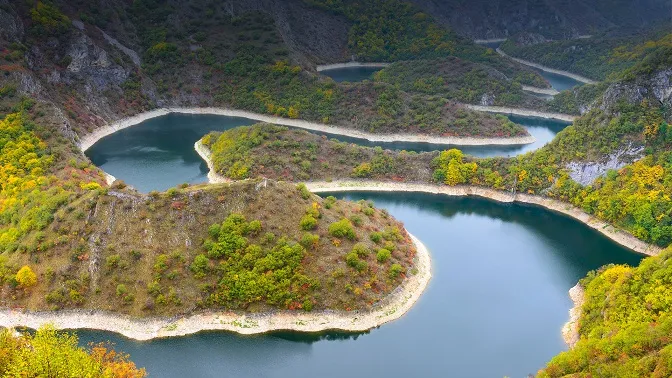
Today RCs on Hive are an ocean.
Nobody creates a budget for how they're going to spend RC bandwidth. Nobody has a spreadsheet that shows optimal paths to get the most bang for our buck. RCs on Hive are, for practical purposes, infinite. The only people who run out are pretty much new users that don't know how it works and end up getting the RC error message asking what it means. Even in those cases, there are my users around here willing to give out free delegations. Myself included.
Where will bandwidth flow?
So far it's chaotic and unrestricted. When resources are abundant, they tend to get wasted. I often notice when this happens because it makes me cringe. I try to avoid wasting resources even when there is no financial incentive to do so. Just because something is free or near-free doesn't mean we should casually waste that asset whenever it suits us. That's such selfish and unsustainable behavior at the core. This is why we can't have nice things.
When grocery stores in California started charging 10 cents per plastic/paper bag I was floored at how effective it was at changing people's behavior. In fact it's been the subjects of multiple posts. Micro-charges are provably a very good tool for population control. Suddenly instead of everyone throwing away 10 plastic bags on every grocery trip many people started buying reusable bags. Just another weird example of how capitalism can regulate itself without anyone being in charge. If only that was the standard.
Of course there is some debate about whether this policy has any affect whatsoever on the environment (same with banning straws) but that's not the point. Something went from free to not free and the behavior changed. That's what matters, and the point is incontestable.
The biggest example I can think of is when my landlord was paying the electric bill at my last place. So of course my roommates just cranked the AC because "who cares it's free". It was uncomfortably cold and one or two of my roommates would just leave their windows open while it was on. Seriously I still can't believe those blatant attitudes. Sitting in my own house with sweatpants and a hoodie on while it's 105 outside.
Well wouldn't you know it one day our landlord was over it after receiving multiple $500+ utility bills. He actually lowered our rent a bit and told us to deal with the power bill because he was over it. Lo and behold, we stopped setting the thermostat to 68 degrees. Shocker.

The same thing will happen to Hive.
Yeah, sure, today everyone posts 'lol' to chain and whatever else. Why wouldn't they? It's a social media site, right? Ironically I personally might be one of the most egregious offenders in this regard. I did, after all, fill up an entire Hive block with 65KB of data testing the block limits of the chain back when I was messing around with the Hive API.
Did I say 'data'?
I meant 0123456789 copy and pasted 6500 times in order to reach the limit. Check it out if you haven't seen it. What's even funnier is that the post was paid out $2 on what essentially amounts to a spam post (which was relatively a lot as I didn't get a lot of upvotes in 2018). "Who is this @acidyo guy?" Ah maybe the test was worth it. Who knows?
Point being that this kind of data will be expelled from the chain quite quickly when we have more infrastructure. More infrastructure means more ways to actually post valuable data to the chain. The more valuable RCs become the more valuable the data we post to the chain must be. These are the rules of WEB3: we pay for service but we also get paid for generating value. Not generating value is simply a waste of money. That's a much more sustainable model than what WEB2 has to offer. WEB2 is all about free service, and once again we can see all the ways that this free service has been exploited over the last decade or two (mostly Sybil attack via bots and multi-accounting).

It is the inevitable nature of Hive to go from being an ocean of unlimited resources to a river in which value flows in more predictable patterns. What will those patterns look like? I have no idea. I just know they'll exist. No reason to post 'lol' to chain when we can just as easily post it off-chain and everyone still gets the message. Of course once again this assumes infrastructure is in play that hasn't been invented yet.
But still the rule is universal
The paths of least resistance will always be taken more often on the average. Within the context of RCs the path of least resistance is simply the data that generates the most value. Should blog posts suddenly be less valuable than some other activity (say gaming or second-layer tokens) then less blogs will get posted and more of the other thing will be stored on chain.
What is a comment?
The language we use to describe what things are on the blockchain leads many to make incorrect assumptions. Andreas Antonopoulos has a very good video on this concept. In fact spooling through the video a bit it seems to be a theme across multiple videos I've watched of his years back. Words like "Bit-Coin" and "Wallet" don't actually make sense.
When people here "wallet" they're thinking "okay cool so the money is stored inside the wallet". To which we reply no your money in on the Bitcoin Network and your wallet simply has access to it. You can also copy your wallet multiple times across multiple devices so it's more of a "keychain".
But we don't call it a keychain, we call it a wallet, even though on a technical level keychain would make more sense, the people who named these things wanted to use lingo that applies to the previous financial system. Same thing goes for Bitcoin, which is neither a 'bit' or a 'coin'. Rather Bitcoin is a network of trust. TrustNet would have been a better name, but here we are. No going back now.
The same applies to comment on Hive.
People see "comment" and "discussion" and "social media" and think that's what Hive is. That is not what Hive is. To me a "comment" is simply a declaration that work has been done and gives the Hive network an opportunity to reward it with upvotes from the reward pool. It does not have to be a social interaction or a blog post. In fact, there's even a special place on the comment object that can house raw javascript code and be pulled directly from the API. "It is simply data that the network can choose to reward," he said as he continued writing his blog post.
Conclusion
Hive is still in the early game. Resources are abundant, and many assume that they will always be abundant and infinite. To the point we even allocate this ideology in the marketing itself: "Hive has free transactions." Yes, well anyone who's gotten a not-enough-RC error message may beg to differ. Oddly enough, this is a good thing, as it prevents the network from being Sybil attacked like all the WEB2 products that deliver actual free services (in exchange for your digital soul).
The real fun begins when Hive runs out of RCs. Where will those resources go? How will they be allocated? What kind of apps will be built here that end up somewhat deprecating the old ones? Not everyone can be blogger (even if they wanted to: which they don't). We need to continue lowering the bar of development and value generation so everyone on the network can participate in one way or another. We need more jerbs. The grind continues.
